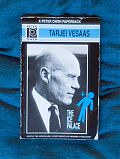
Tarjei Vesaas
The Ice Palace
There are good books, bad books and books that linger; books that create an air that infuses into one’s life in a way that is similar to dreams. Where dreams are tenuous and made of a sporadic fabric, books are not: their stories are contained between a beginning and an end. But a book’s air can linger, can infect waking life and dream.
Due to the absolute unportability of my hardcover edition of War and Peace, for a recent trip I picked The Ice Palace from my shelf, fooled by its shortness. Like I wrote above, it is a book that does not let one go easily. It is powerful, almost like the ice palace it describes and eludes.
The ice construction rises above them, enigmatic, powerful, its pinnacles disappearing into the darkness and the winter cloud drift. It seems prepared to stand eternally—but time is misleadingly brief, it will fall one day when the floods begin.
Siss and Unn are eleven year old girls. They are in the same class at the same school. They are the same height and almost look the same. Siss is popular, a group leader, while Unn stands the outcast against the school wall. Unn is an orphan and therefore mysterious, she has shunned the group and Siss, she lives with an old Auntie and has no friends. But Unn and Siss are relentlessly curious about each other, they play a familiar back-and-forth of attention and rejection. Finally, on a freezing winter evening, they come together.
To spare you too many details, the following day Unn vanishes, she slips deeper and deeper into the ice palace through passages of nearly perfect prose. It is here the ice palace takes mythical proportions, becomes an enchantment by the secret that it holds; it is here that my interpretation of this book flounders, for the ice palace can be almost everything, even the book itself.
The ice palace could be the impurities of the adult world. When “the men” go out searching the snow, the forests, the frozen lake for Unn they find themselves standing below the ice palace, enchanted, they cannot move. They are loyal searchers; they manage to keep their secret thoughts under lock and key. They do not go exploring, like Siss and Unn, they remain safe, and Siss watches their inertness, “appalled at grown men.”
The ice palace could be the secret Unn did not tell that single evening the two girls shared. Or it could be the secrets they did share. They had crossed over some line, discovering the self in the not-self for the first time; more than a friendship but not a relationship, something new and something fresh.
She would say before they parted: You can tell me more another time. Whenever you like, another time. We couldn’t have gone further this evening. It had been a great deal as it was. But if they were to go further it would make things impossible.
The ice palace is a conjurer. It changes color and shape depending on the weather and the light. Maybe it is Tarjei Vesaas who is the ice palace. More than the ice and more than the snow it is the seamlessness of his words, their brilliant shifting between third person and first, their succinct placement and descriptions, that have stayed with me, strongly enough, to inhabit my dreams.
· · · · · · · · · · · · · · · · · · · ·